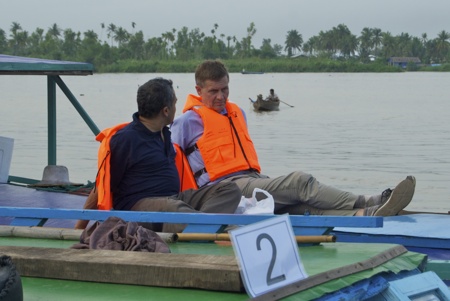Norway is joining other countries around the world in moving away from years of sanctions against Burma and towards what they all like calling “dialogue.” Top government minister Erik Solheim (photo) admits the sanctions don’t seem to have worked, so he has traveled to Burma this week, hoping diplomacy will.

“Norge snakker igjen med Burma (Norway talking again with Burma),” was the headline blasted at the top of newspaper Aftenposten’s front page on Monday. The talking actually has been going on for more than a year, and it may be more a case of “Burma talking with Norway again.” With Norway the home of not only the Nobel Peace Prize, awarded to Burmese opposition leader Aung San Suu Kyi in 1991, but the opposition Democratic Voice of Burma as well, the country hasn’t exactly been on the ruling generals’ favorites list.

Recently, however, Burma has shown some signs of opening up. Several high-ranking Norwegian government officials have been in Burma including Solheim himself over the past year. This time, Burma even granted press visas to a few Norwegian journalists, in a move that some Norwegian Foreign Ministry diplomats have called “historic.”
So Norwegian Broadcasting (NRK) and newspapers Dagens Næringsliv (DN) and Aftenposten are traveling with Solheim and his delegation, first to view cyclone damage in the delta southwest of Rangoon and then up to the new capital for talks with some Burmese ministers from the military.
Pressured into accepting aid
It was the cyclone itself in 2008, which followed the tsunami four years earlier, that all but forced the ruling junta to open up to needed foreign aid. The agreement finally allowing aid workers into Burma, however, expires this summer. Humanitarian organizations like Norsk Folkehjelp are urging officials like Solheim to help allow more aid to keep getting in, and fewer sanctions, reports DN.
The military rulers also have said they will hold a new election later this year. Even though Aung San Suu Kyi’s party has been disqualified from participation, Solheim is among those seeing a glimmer of opportunity.
“No one expects the election to be free and fair,” he told news bureau NTB last week. “At the same time, I have the impression that many have some hope that the election will lead to some political changes.”
He notes that the top ruling general, Than Swhe, is 79 years old and “a generation shift” is underway. “Then it’s important to have a good dialogue both with today’s holders of power and those coming after them,” Solheim said.
‘Building up confidence’
He also wants to “build up confidence” among the Burmese rulers so keen to hang on to power. By the end of this year, Norway will have donated NOK 420 million in development aid to Burma since 2007, so that may win Solheim their ear. If so, he’s also keen to talk about climate issues.
Skeptics remain. Some feel the military must take a proactive role to emerge from isolation. China continues to pay a major role, as a key investor in Burma and one of the few countries that can get Burma to listen.
“We need to have a long-term perspective,” Solheim told DN, “and work so that Burma can move in almost the same direction as other Southeast Asian nations.”
Views and News from Norway/Nina Berglund
Join our Forum if you’d like to comment on this story.

